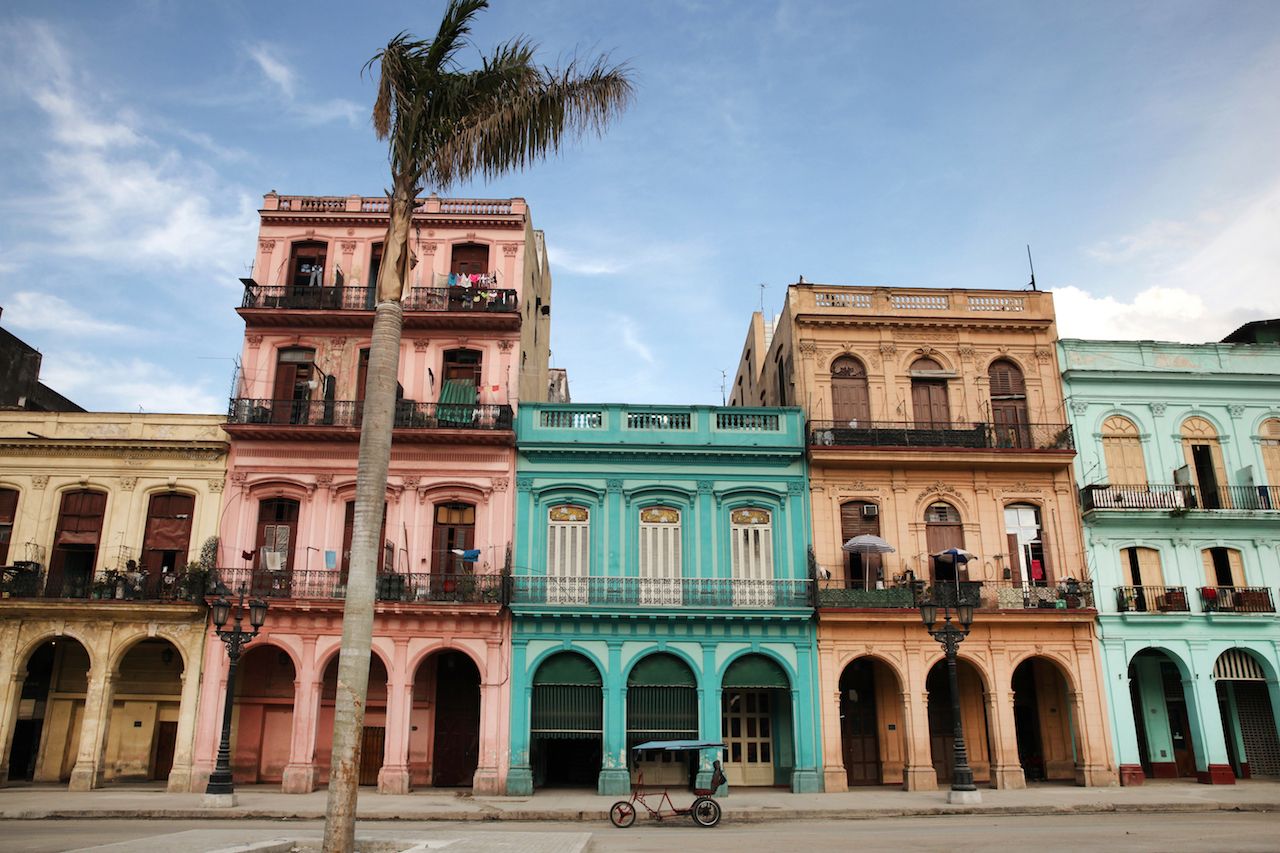
I sincerely thought I would cry when I landed in Jose Marti airport with the immediate waft of cigar smoke hitting my nose the second I got off the plane. Smoke that smelled like every old Cuban’s house I had ever been to. I never thought I would actually go to Cuba. My mom left Cuba in 1969 as part of a sponsorship program that allowed Cuban families to legally leave and seek refuge in America and almost everyone had the intention of going back someday. But that day never came, so we all became Cuban Americans.
The weekend I left was the same weekend that Americans fled to major airports to protest Trump’s refugee ban. There I was, heading on a plane, at a time when refugees were being both insulted and defended — I was returning to the very place my refugee family left.
When people fled Cuba in the late 60s, Castro famously called them all worms, or gusanos. The worms were never to be welcomed back. They were considered less than human and to be treated as such. Forever.
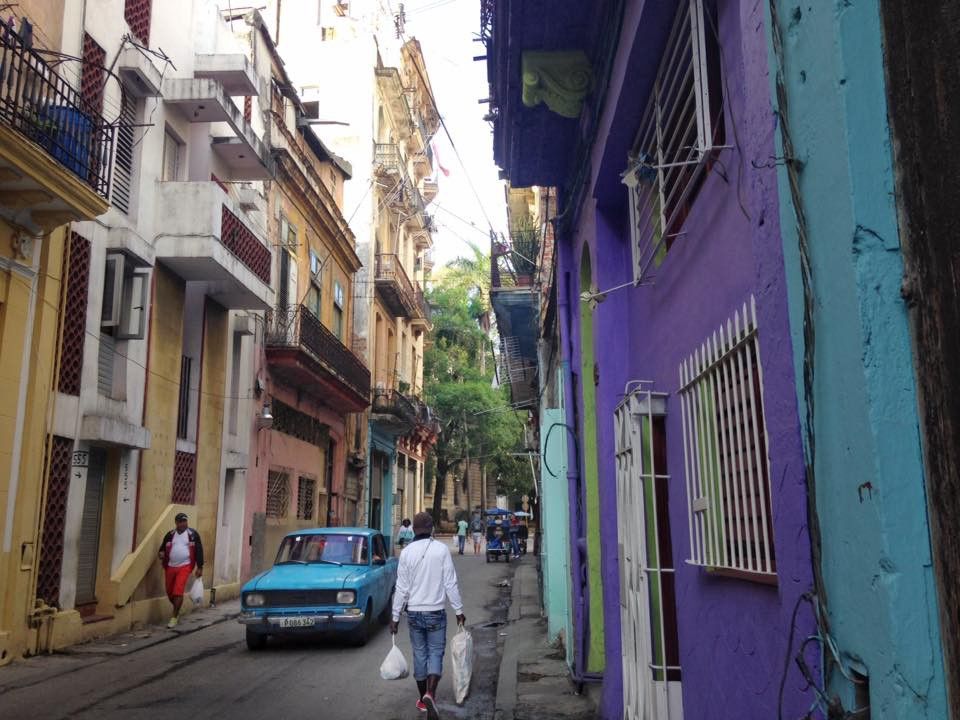
Morning in Habana Vieja.
Decades later, la hija de los gusanos was visiting for the first time. I really felt the weight of that as I walked around Havana, where tourist hotspots were dispersed among local shops and deteriorating apartments. Part of me felt like a regular tourist enamored by the colors and culture and the other part of me had this dirty little secret. I was the daughter of the worms and I was touching the soil.
My trip was pretty rushed as I bought the tickets in a flash deal from JetBlue and had to return after four days to meet obligations back in Chicago. As a result, I didn’t plan meeting my family very well. I didn’t realize how spread out people were between Havana and Matanzas — the distance essentially of Chicago to Milwaukee — and that it would be hard to coordinate meeting everyone during the week and enjoying my time exploring Havana as a tourist. I had planned to visit my Tía Ada in Matanzas on my last day in Cuba, whom I didn’t know existed before this trip. She and I spoke on the phone several times before I came down, catching up and on entire lives that neither of us knew about. She did know about me, but meeting Adelina’s grandchildren felt impossible to her and her eight siblings left behind in Cuba. None of them ever really thought they would meet me.
Until now.
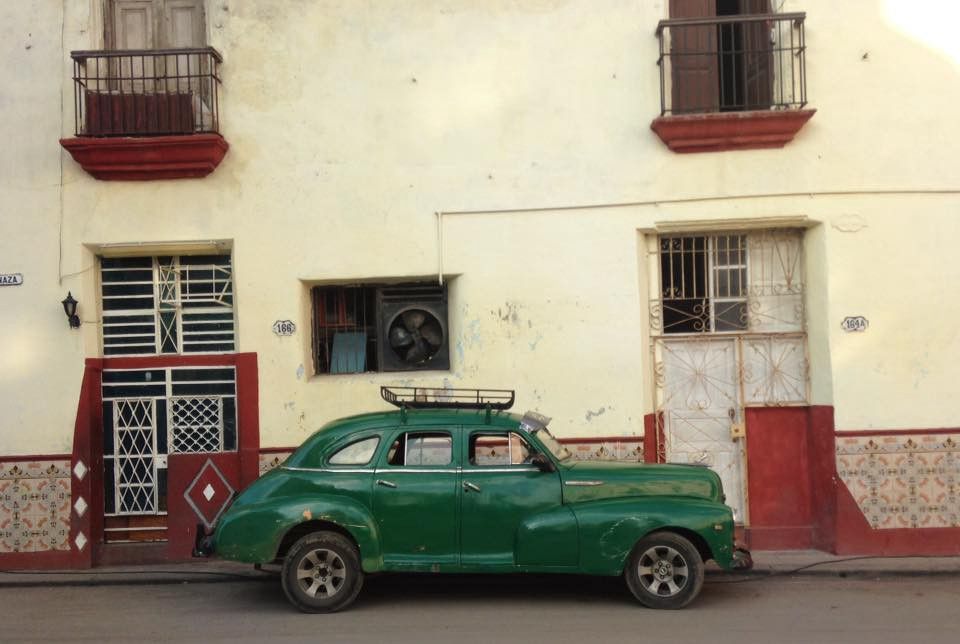
I stayed in Havana in a casa particular, essentially Cuban Airbnb before Airbnb was really a thing (but it is available on Airbnb and definitely my recommendation for anyone traveling to Cuba). Tamara and Victor met me and let me stay in their beautiful apartment with a balcony that overlooked the bustling Calle Obispo. They were both sweet and patient with my first attempts at fully native Spanish. I’ve always been used to falling back on English words when speaking Spanish in America, but now I was in the wild west of language. I felt like I was slowly turning rusty wheels in my head to form all the grammatically correct sentences. After a while, the three of us got along in decent Spanglish.
I knew I was just warming up my Spanish tongue, but I was frustrated I wasn’t better. I can read and write in Spanish well, but have always been timid with speaking. It’s really more of a mind game for me. I know the words, but I’ve always been shy about it. I can now see that this saddened my grandparents. There I was, a girl who rarely spoke to them because she was afraid. Afraid of what? Judgement. I had heard them “tell it like it is” about so many other people, make fun of other people’s bad Spanish, that I was scared of being made fun of for my own bad Spanish. Instead, I just listened to them.
I grew up torn between cultures in a Midwestern town whose motto is “The Home of Proud Americans.” From that alone you could probably guess how many minorities lived there, let alone Latinx people. It was an overwhelmingly white American place, where being an outsider as a kid felt like a death sentence. Imagine my horror when my mother would attempt to speak Spanish to me in public! I didn’t want anyone to know that I was different, so for a few formative years I suppressed it, which really impacted my Spanish language abilities. I had to improve my Spanish later in life and stumble through it like a baby deer trying to walk.
Still, my Spanish in Cuba was better than most Americans, according to Cubans I met. As the days passed, my Spanish got stronger and my confidence grew. No one judged me. They were all happy to have someone to talk to as we waited in long lines together. Multiple people asked me if I was Spanish as they tried to determine my accent. Whenever I said I was American, they were dumbfounded. An American that can understand Spanish?! The dumb American stereotype has even made its way to isolated Cuba!
“Cuban American,” I would tell them. “My mother is from here.”
“Oh…then why don’t you speak better?”
That’s the Cuban familiarity I’ve grown up with. Blunt honesty that can cut you like a knife, but it always means well.
I stayed in Havana to be a tourist and explore the city my mom lived in before she came to America. She would often point to certain buildings in pictures of Old Havana and say, “that, right there. That looks like the apartment we lived in. Is it the same one?”
I took in all of the decaying buildings, the colors, the people, the sun. It put my family’s immigration story in a new perspective for me. Mostly because Cuba is beautiful. It’s gorgeous, despite the chipping paint and crumbling brick. It’s all so beautiful that there’s no way this was easy for my grandparents to leave. They made this enormous sacrifice that I always somewhat understood, but I appreciated so much more as I walked up and down Paseo del Prado watching families and friends gather on gorgeous sidewalks. I would think: that used to be them. These are the memories my grandparents have. This is why they get tears in their eyes when they think about la patria.
It was also striking how foreign and remote Cuba feels despite being very close to America AND despite actually being Cuban. It still felt foreign. It made me feel in many ways very American. Internet was not widely available, people waited for hours in lines to do anything and everything (I had many nice conversations with people I met in lines because there’s nothing else to do but chat when you might be in a line for two hours) and there was no advertising (only propaganda).
It all made me wonder how my mom felt coming to America, a very foreign place, as a child with no English skills. She told me the first food she ate when she got to her uncle’s house in Chicago after a long plane ride was a Reese’s Peanut Butter Cup and that it was the best thing she had ever tasted. Imagine if that was your first taste of American food. ¡Viva América!
I absolutely loved Havana, but I had promised to visit Matanzas and see the family that was left behind on my last day. The bus to Matanzas was cheap, but it was all sold out when I got to the station. A taxi would be too expensive — after all, Cuba is cash-based and the ATMs do not carry American money. I didn’t budget for that trip. It wasn’t like I could ask my family for money as no one had anything. I felt stuck, until I thought of something.
The Hershey Train! The train left Casablanca, a ferry ride across the bay from Havana — stopped in Arcos de Canasi, which is where my abuela was from — and finally stopped in Matanzas. It would be perfect…except the train was built in the 1920s and has never been updated. It was built about 100 years ago when Hershey Chocolate built a town and sugar mill in Cuba. After the revolution, Hershey left, but the dilapidated train remains. It was a janky, four-hour journey that was known to break down and take twice as long as promised.
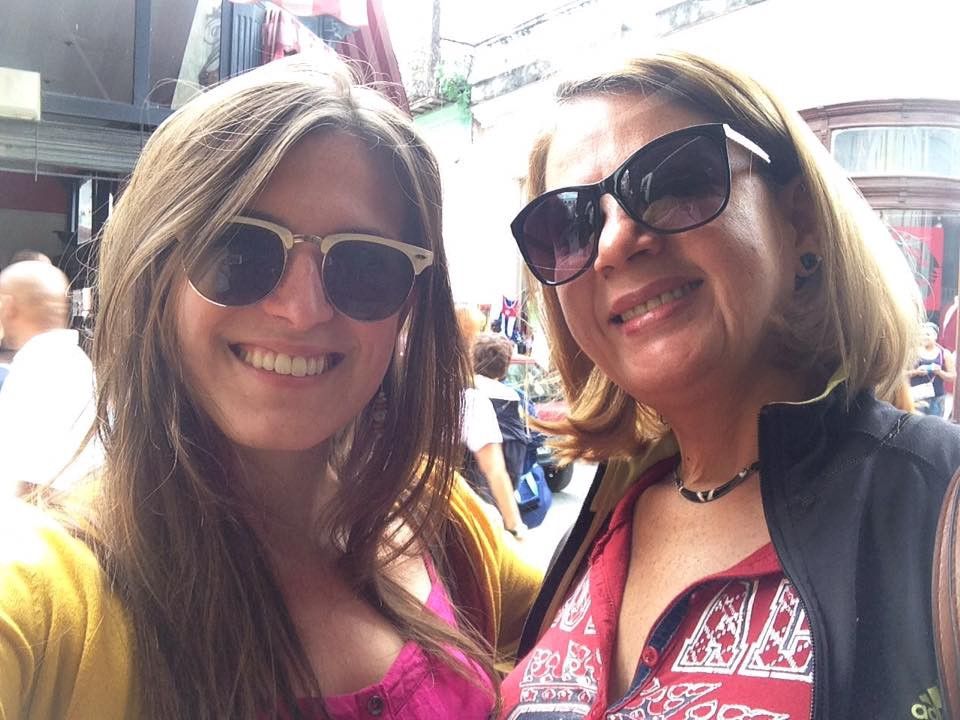
A friend I met in line named Daisy. She asked us to take a picture together and we’ve e-mailed back and forth a few times.
When I got to the train station in Casablanca, I called Ada and told her my plan and she did what all loving Cuban relatives do: yell at you about how terrible your idea is.
“Es una máquina muy mala! No! Toma un taxi a Matanzas — no tren!” It would break down, she said, it’s so terrible. She made it sound like I would die on this journey.
I called my mom and explained to her what was happening. We brainstormed about ways to get there (my mom could wire me money? No, only Cuban citizens can be sent American money so I would have needed someone’s social security and that somehow felt like identity theft). But ultimately, I didn’t think I could make it out to her in time and with enough money. I was at the station, ready for pay for a ticket, but it seemed like this would be a bad idea. Even the ticket agent told me that the train was likely to break down. What? Who does that when selling a product?
“It always does,” she told me. “It will take you a long time to get there…but it’s fun.” She added that last part, perhaps because she saw the look on my face and wanted to still sell me on this adventure. It was too risky and too time consuming to take the train.
So I called Ada, bracing myself for her heartbreak. I imagined she had been looking forward to meeting me, to seeing the remnants of her sister’s face in mine. I expected her to cry as she did when I called her first and talked to her about meeting for the first time. But that’s not what happened. She sounded very understanding, happy to hear from me, and calm.
“It is okay,” she told me sweetly and talked about how there will definitely be a next time. She added, “That’s Cuba!”
That’s Cuba. That’s the saying I heard so much from Cubans and other tourists in Havana. “That’s Cuba.” Things don’t work. They don’t go according to plan. It’s often best not to have a plan. Now I understood why my grandparents could never be held down to a time when it came to family events. Anything can happen, don’t worry so much. That’s the Cuban way.
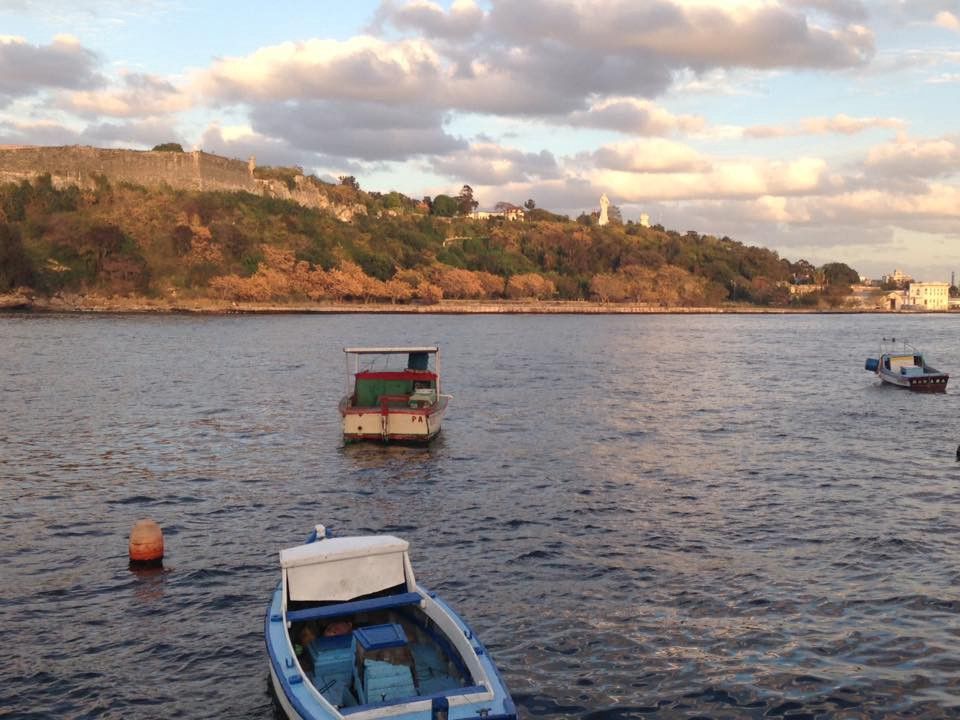
Sunset over Casablanca from El Malecón.
I spent my last day walking around Casablanca before returning to El Malecón and reading by the sea wall. At this point I blended in (with the help of my abuela’s gold bangles that I wore, realizing every little Santerian girl in Cuba wore them, too). No one catcalled me and a few tourists asked me for directions. Did I really look like that much of a local after a couple days?
That’s what I loved about going to Cuba as a Cuban American. It was so foreign, but so familiar. The rhythms felt similar to those I had grown up with and the ways everyone behaved with each other — friendly, affectionate, and always ready to laugh — was exactly how my big Cuban family always was. I felt so connected with my family there, despite not being able to make it out to see everyone.
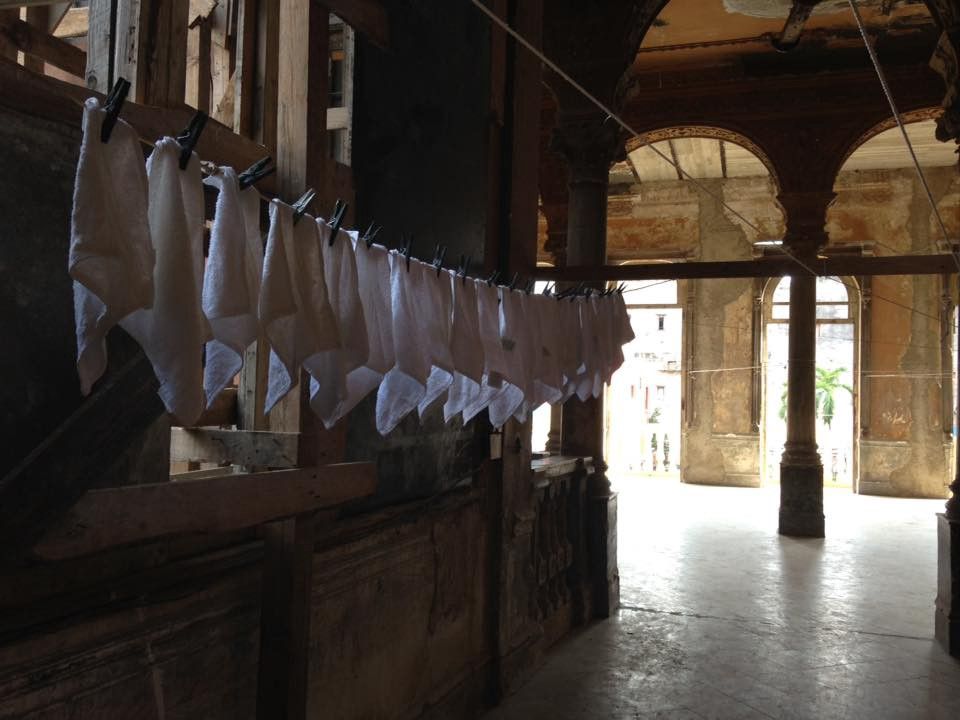
When I left the following morning, Tamara and Victor gave me a present. It was a book of Cuban poems. They told me that any time I come back, I am welcome at their house for dinner.
“You are family now,” they wrote to me in a handwritten letter.
So in a way, I did get to meet my family. They just happened to be new family. ![]()
This article was originally published on Medium and is republished here with permission.
The post What it’s like traveling to Cuba as a Cuban American appeared first on Matador Network.






